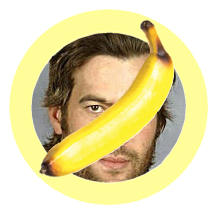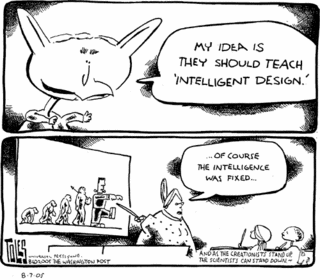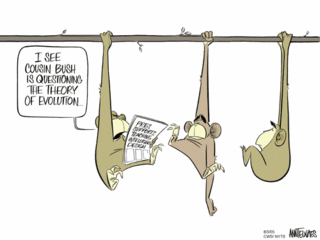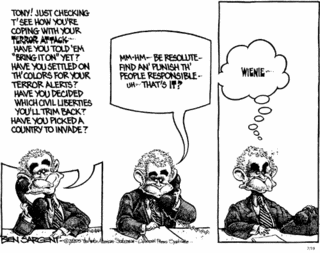Tuesday, August 09, 2005
Bananas For Bertuzzi

With his usual shameless mealy-mouthedness, commissioner Gary Bettman announced yesterday that Todd Bertuzzi has been reinstated to play in the National Hockey League. As all hockey fans know, Bertuzzi was suspended indefinitely late in the 2003-04 season for an act of shocking barbarism and stupidity even by NHL standards: the sucker-punching from behind and subsequent pummeling and symbolic sodomization at centre ice of the semi-conscious body of Steve Moore, Colorado Rockies forward and Ivy League graduate.
After missing a playoff season in which the Canucks had little chance of victory, and missing out on an extended European vacation playing mediocre hockey during the season-long NHL lockout, Bertuzzi has been deemed to have endured "appropriate discipline" and is now free to start earning his US $5.3 million annual salary. The lockout was actually a bit of good luck for Bertuzzi and the Canucks, owing to a condition in the plea-bargain his lawyers struck with the courts concerning the charges precipitated by his attack: upon pleading guilty to assault causing bodily harm he was sentenced to a year's probation and 80 hours of community service, and enjoined "not engage in any sporting activity involving Mr. Moore as a participant." Imagine what would have happened if the Canucks and Rockies had met in the playoffs (a far from improbable eventuality), and a reinstated Bertuzzi was obliged to sit in the pressbox while Colorado cunningly sat Moore at the end of the bench - which is about all they would have been able to do since Moore, now an unrestricted free agent, has injuries arising from the "Bertuzzi Bushwhack" that will likely prevent him from ever playing in the NHL again.There is, of course, a law suit going forward concerning this matter in the Colorado courts - but we all know these things tend to drag on, especially in the USA (Moore's camp seems to have made some rather bizarre choices of defendants, including a player, Brad May, who now plays for Rockies). For a true hockey fan, however, no amount of legal bullshit can compensate for the fact that what Bertuzzi did was gutless, wacko and totally out of keeping with the code of honour that has ruled the game from time immemorial. As might have been expected from someone with a decent education on and off the ice, Moore obeyed that code during his first return to Vancouver following his dramatic but entirely legitimate collision with Canuck captain Marcus Naslund on Feb. 16, 2004, when he fought Vancouver journeyman Matt Cooke in the first period. This was, however, not enough for Bertuzzi, who driven by his own warped sense of responsibility - and no doubt goaded by the fact his team was being waxed by Colorado 8 to 2 - launched his infamous attack midway through the third period. The rest, as theysay, is history.
But is the hockey fans' sense of honour history? Do we have to put up with the travesty of this brainless goon being turned loose on the ice while his victim languishes in a medical-legal hell? Are we going to cheer when this troglodyte is invited to once again suit up in the hallowed red and white of the greatest national team the sport has ever seen? For shame, I say! For shame! But what to do? The events of the last year have proven conclusively that the NHL has totally been given over to rogues and scallywags, but a year of watching non-hockey has also been enough to prove to most fans that no other sport comes close to capturing the flow, beauty, drama and urgency of that ballet on ice with wooden (or aluminum, or graphite) sticks. Hockey needs its fans back, but it has misguidedly decided that it also needs uncouth defilers like Bertuzzi, so what is a conscientious observer to do?
For the answer we can go back to another incident from the dim mists of Canadian sports history. During the 1963 Grey Cup, Hamilton Tiger-Cats lineman Angelo Mosca collided with the fleet legs of B.C. Lions star running back Willie Fleming in what many watching thought to be a late and deliberate out-of-bounds hit, although the replay showed that Mosca was completely committed to making the tackle before Fleming was bumped out of bounds by another player. Fleming was forced to leave the game, and for the rest of Mosca's career he was hounded by fans in Vancouver and other cities who would chant "Mosca Eats Bananas," hold up banners reiterating their chants, and hurl the aforementioned yellow-crescent fruits in his general direction.
Granted, the parallels between this incident and the Bertuzzi Bushwhack are rather superficial. Most notably, while both Willie Fleming and Angelo Mosca ended up in the Canadian Football Hall of Fame, barring the extensive distribution of Whistler Hydroponic weed to the voters the only way Moore and/or Bertuzzi will get ever into the NHL equivalent will be by buying a ticket. There is, nevertheless, a certain Gandhian simplicity to the treatment "Big Ange" received from irate football fans, and the fact that Vancouver fans were especially aggrieved makes it ironically apropos that the same mob justice be meted out to the Goon of Orca Bay. And so, without further ado, we announce the "Bananas for Bertuzzi" campaign.
You know what to do.
P.S. Plastic bananas show much better on TV than the real thing.
Monday, August 08, 2005
Friday, August 05, 2005
Thursday, August 04, 2005
Islam and Multiculturalism
The carnival of culture
Multiculturalism has to be a robust exchange of ideas,
rather than of festivals and food
Hanif Kureishi - Guardian - Thursday August 4, 2005
Recently, a friend sent me an article which he thought
I'd find interesting as it was an attempt to sustain a
non-violent version of Islam, one in which meddling
clerics had no authority. Without the requirement of
intermediaries, no one could come between you and God.
The clerics were seen here as political figures,
rather than the best interpreters of Islam. If these
fanatics and fundamentalists had twisted the word of
God for their own political ends - why shouldn't the
Qur'an be reclaimed and reinterpreted by the better
intentioned? This, the writer stated, was the only way
for Islam to go.
In the early 1990s, after my first visit to Pakistan,
where I'd had a taste of what it was like to live in a
more-or-less theocratic state, after the fatwa against
Salman Rushdie and, finally, the death of my father, I
began to visit various London mosques. Perhaps I was
trying to find something of my father there, but I was
also beginning to research what became The Black
Album, a novel that concerned a group of students;
young radical Muslims in west London who burn The
Satanic Verses and, later, attack a bookshop. A film I
wrote for the BBC, My Son the Fanatic, about a young
man who becomes a fundamentalist while his father
falls in love with a prostitute, also emerged from
this material.
I believed that questions of race, identity and
culture were the major issues post-colonial Europe had
to face, and that inter-generational conflict was
where these conflicts were being played out. The
British-born children of immigrants were not only more
religious and politically radical than their parents -
whose priority had been to establish themselves in the
new country - but they despised their parents'
moderation and desire to "compromise" with Britain. To
them this seemed weak.
My father was an Indian Muslim who didn't care for
Islam; his childhood hadn't been much improved by a
strict schooling and teachers with sticks. Towards the
end of his life he preferred Buddhism to Islam, as
there was less aggression and punishment in it. ("And
altogether less religion," as he put it.) He had also
become disillusioned with the political version of
Islam, which my father's school friend, Zulfi Bhutto -
who the liberal classes thought would become a
democratic and secular leader - was introducing to
Pakistan.
The mosques I visited, in Whitechapel and Shepherd's
Bush, were nothing like any church I'd attended. The
scenes, to me, were extraordinary, and I was eager to
capture them in my novel. There would be passionate
orators haranguing a group of people sitting on the
floor. One demagogue would replace another, of course,
but the "preaching" went on continuously, as listeners
of all races came and went.
I doubt whether you'd see anything like this now, but
there would be diatribes against the west, Jews and -
their favourite subject - homosexuals. In my naivety I
wondered whether, at the end of his speech, the
speaker might take questions or engage in some sort of
dialogue with his audience. But there was nothing like
this. Most of the audience for this sort of thing was,
I noticed, under 30 years old. I had the good sense to
see what good material this was, and took notes, until
one afternoon I was recognised, and four strong men
picked me up and carried me out on to the street,
telling me never to return.
Sometimes I would be invited to the homes of these
young "fundamentalists". One of them had a similar
background to my own: his mother was English, his
father a Muslim, and he'd been brought up in a quiet
suburb. Now he was married to a woman from Yemen who
spoke no English. Bringing us tea, she came into the
room backwards, and bent over too, out of respect for
the men. The men would talk to me of "going to train"
in various places, but they seemed so weedy and
polite, I couldn't believe they'd want to kill anyone.
What did disturb me was this. These men believed they
had access to the Truth, as stated in the Qur'an.
There could be no doubt - or even much dispute about
moral, social and political problems - because God had
the answers. Therefore, for them, to argue with the
Truth was like trying to disagree with the facts of
geometry. For them the source of all virtue and vice
was the pleasure and displeasure of Allah.
To be a responsible human being was to submit to this.
As the Muslim writer Shabbir Akhtar put it in his
book, A Faith for All Seasons, "Allah is the subject
of faith and loving obedience, not of rational inquiry
or purely discursive thought. Unaided human reason is
inferior in status to the gift of faith. Indeed,
reason is useful only in so far as it finds a use in
the larger service of faith."
I found these sessions so intellectually stultifying
and claustrophobic that at the end I'd rush into the
nearest pub and drink rapidly, wanting to reassure
myself I was still in England. It is not only in the
mosques but also in so-called "faith" schools that
such ideas are propagated. The Blair government, while
attempting to rid us of radical clerics, has pledged
to set up more of these schools, as though a
"moderate" closed system is completely different to an
"extreme" one. This might suit Blair and Bush. A
benighted, ignorant enemy, incapable of independent
thought, and terrified of criticism, is easily
patronised.
Wittgenstein compared ideas to tools that you can use
for different ends. Some open the world up. The idea
that you can do everything with one tool is
ridiculous. Without adequate intellectual tools and
the ability to think freely, too many Muslims are
incapable of establishing a critical culture that goes
beyond a stifling Islamic paradigm. As the Muslim
academic Tariq Ramadan states, "Muslims now need, more
than ever, to be self-critical. That means educating
young Muslims in more than religious formalism."
If the idea of multiculturalism makes some people
vertiginous, monoculturalism - of whatever sort - is
much worse. Political and social systems have to
define themselves in terms of what they exclude, and
conservative Islam is leaving out a lot. In New York
recently, a Turkish woman told me that Islam was
denying its own erotic heritage, as shown in the
Arabian Nights, The Perfumed Garden, and the tales of
Hamza. Indeed, the Arabic scholar Robert Irwin says of
the Arabian Nights: "In the modern Middle East, with
certain exceptions, the 'Nights' is not regarded by
Arab intellectuals as literature at all."
It is not only sexuality that is being excluded here,
but the whole carnival of culture that comes from
human desire. Our stories, dreams, poems, drawings,
enable us to experience ourselves as strange to
ourselves. It is also where we think of how we should
live.
You can't ask people to give up their religion; that
would be absurd. Religions may be illusions, but these
are important and profound illusions. And they will
modify as they come into contact with other ideas.
This is what an effective multiculturalism is: not a
superficial exchange of festivals and food, but a
robust and committed exchange of ideas - a conflict
that is worth enduring, rather than a war.
When it comes to teaching the young, we have the human
duty to inform them that there is more than one book
in the world, and more than one voice, and that if
they wish to have their voices heard by others,
everyone else is entitled to the same thing. These
children deserve better than an education that comes
from liberal guilt.
· Hanif Kureishi is a screenwriter and novelist






